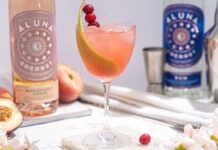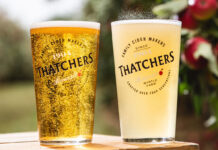Consumer quest for new flavours is driving sales in Scottish on-trade
An appetite for new flavours and products, coupled with the continued popularity of cocktails, is opening up all sorts of possibilities in the on-trade.
And sales of speciality spirits and liqueurs can only stand to benefit, say drinks firms.

“The cocktail boom over the past few years has increased consumer demand for a broader range of spirits on the back-bar,” said Andrew King, managing director of cocktail mixer brand Funkin.
“As the cocktail culture continues to grow, we are seeing that it is no longer enough to be different.
“Recent CGA data confirms that consumers are broadening their palates and looking for variety and innovative flavours.”
These new flavours are often found in products outside of the mainstream, according to Simon Green, marketing director at Global Brands.
Quoting CGA figures, Green put the value of the speciality spirits and liqueurs sectors at £1.3 billion, with the value having grown by 3% in the past year.
“One of the key drivers for this growth could be consumers’ demand for mixability and new flavours, which are currently limited by mainstream brands,” he said.
And the trend is expected to continue.
Julia Bliss, brand manager for Licor 43 at distributor Cellar Trends, said consumer research from the firm found 47% of respondents were drinking cocktails at least once a month.
“As cocktails become more mainstream and viewed as an ‘everyday treat’, they will drive the spread of servings into mainstream pubs, restaurants and hotels by 10% come 2017,” said Bliss.
“This renewed interest in cocktails, which has been spurred by television shows like Mad Men, has exposed drinkers to more premium spirits.
“Over the past two years the average back-bar in Britain has increased its brand selection by 25%, made up mostly by premium brands, to accommodate the growing numbers of ‘weekend millionaires’ who favour quality over quantity.”
The summer months, in particular, could provide an opportunity to sell more speciality spirits and liqueurs, according to Dan Bolton, managing director of drinks firm Hi-Spirits.
Bolton said there are “real profit opportunities” by offering customers the right range of drinks.
“Later evenings tend to favour ‘shots and shorts’, so a key way to extend sales earlier in the evening is to offer more long drinks, particularly across the summer,” said Bolton.
For consumers not choosing their drinks from a list, visibility is key to introducing customers to new products, said Jonathan Dennys, customer marketing and insight controller at Mast-Jaegermeister UK.
He said: “At least 60% of consumers will not buy what they cannot see and 43% of consumers are undecided when they reach the bar and take between ten and 30 seconds to make their decision, so making sure that premium brands are highly visible is vital to maximise sales.”
Enthusiastic staff are also a must when it comes to driving sales of speciality products.
“Get your staff involved – it will fuel their interest in the drinks you serve and make them really feel part of the business,” said Ashley Moore, category development manager at Diageo.
“If your staff are inspired about what they’re serving, they will be able to make more engaging recommendations to customers, equalling more profit for your outlet.”
























